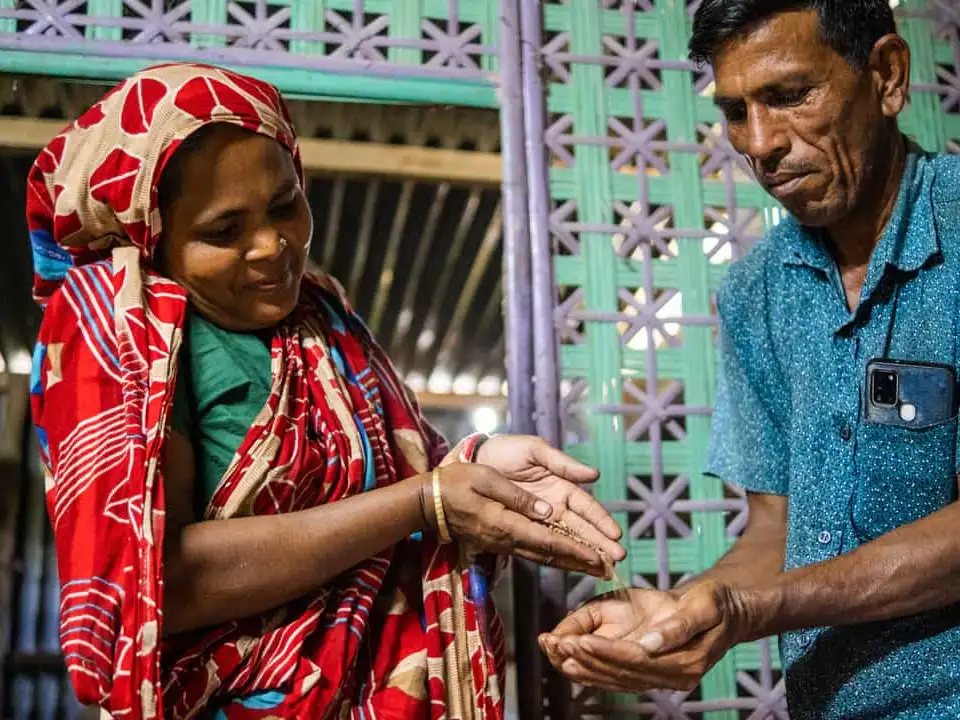

Salina and Mogibor are farmers in Bangladesh who store their own diverse collection of seeds. Salina says: "The company seed is not designed for farming, it is designed for business. I think seeds and business should not go together."
Thousands of Catholics across England and Wales have taken part in CAFOD's Fix the Food System campaign this year. Together, we’ve been urging both the UK government and the World Bank to protect the rights of farmers around the world to save, use, exchange and sell their seeds.
The good news is that the government is listening. We have received a detailed response to our campaign demands, which the government has asked us to share with everyone who has taken part in the campaign.
The bad news is that the government’s response shows they’re failing to help farmers or the environment. Here are three examples.
1. The government fails to acknowledge the ways in which the World Bank places restrictions on small-scale farmers’ access to seeds
In CAFOD’s recent report Sowing the seeds of poverty: How the World Bank harms poor farmers we show how restrictive seed laws, which make it harder for farmers to grow and use their own seeds, are imposed on them because of the World Bank.
But the Government is ignoring this fact. Instead, they parrot the World Bank’s misleading claim that it does “not have a policy in place that restricts farmers choosing their seeds.”
What the Government needs to do is dig deeper in to how the loans work in practice which often result in extensive restrictions on smallholder farmers’ access to and choice over seeds.
Just look at Ghana where the impact of these seed laws was felt hard after new laws were backed by the World Bank as part of its financing to the country.
Edwin Baffour, the Communications Director at Food Sovereignty Ghana said: “In an unprecedented manner, Ghana is proposing and telling the world that anyone who is found exchanging, saving or selling patented seeds can get a minimum sentence of 10 years. Almost 50 percent of the population of Ghana are somehow connected to farm work.”
2. The government ignores how the World Bank’s approach to agriculture is bad for climate change
The letter mentions the importance of climate adaptation and having the right seeds to respond to “rapidly changing climate conditions”. But it fails to even acknowledge that the industrial seeds that the World Bank and UK promote often require chemical fertilisers that are produced using fossil fuels.
Continued fertiliser production is incompatible with the urgent need to tackle the climate emergency. When these fertilisers are used, they release nitrous oxide, which is a greenhouse gas that is estimated to be 300 times as potent as carbon dioxide.
Bringing together production, transportation and use, synthetic nitrogen fertiliser was calculated to be responsible for 2.1 per cent of total global greenhouse gas emissions in 2018 (See section 3.1 and 3.3 of our report).
What the government failed to mention in their response is that it is only through investing in organic fertilisers that will not release further greenhouse gases into the atmosphere that we can tackle the climate emergency.
3. Increased productivity is pushed at all costs, even when there are harmful consequences
The government is effectively arguing that damaging the planet is a price worth paying for short-term productivity gains. This is wrong, because not only are millions of people going hungry, the planet is also suffering.
Chemical seeds and fertilisers may increase productivity, but this has not eradicated hunger. On the contrary, hunger levels are on the rise with the UN estimating almost 350 million people going hungry, double the number from 2020.
Furthermore, industrial seeds are expensive. This can create financial problems for poor smallholder farmers who may not be able to afford them and who are hit hard when prices increase, such as the recent spike in prices following the war in Ukraine. This can leave some farmers even more food insecure as they no longer have access to their own freely available seeds.
These chemical inputs can have detrimental impacts on soil health, air quality and water. We don’t agree that this is a price worth paying for short-term productivity gains as the long-term environmental impacts will be devastating, and it will be smallholder farmers who will be hit first and hardest.
A growing body of evidence shows that agroecological approaches that focus on working in harmony with nature are a proven way to increase productivity, incomes, food security and overall long-term resilience. Climate resilience is mentioned repeatedly in the letter as being a UK government priority, so we want to see the UK put this in to action and start to listen to smallholder farmers across the global south who want to grow food in environmentally friendly ways.
We really need your support to keep the pressure on the government so that they act in favour of smallholder farmers.
The government’ response is not good enough, but we are not going to give up. We need to keep the pressure up and we urge you to Email the UK representative at the World Bank
For more detail on the evidence presented in our report listen to a recent podcast by The Tablet.

